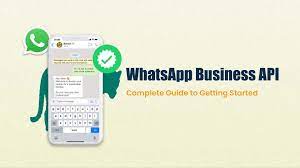
In today’s quickly developing business world, organizations must carefully identify the most efficient communication and sales channels to engage consumers. With the advent of digital platforms like WhatsApp, conventional sales and support approaches are being challenged. In particular, the whatsapp网页版 or Telegram中文 provides revolutionary capabilities that are revolutionizing how organizations handle client relationships. But how does this new digital strategy match up against more established, conventional channels?
The Emergence of WhatsApp Business API
WhatsApp is no longer simply a personal messaging program; it’s become a formidable commercial tool, utilized by over 2 billion people globally. The WhatsApp Business API offers enterprises with the opportunity to handle consumer conversations in a more tailored and automated manner. From WhatsApp ChatBots to CRM integration, the API allows organizations to deliver seamless customer care and sales assistance, offering an advantage over slower, conventional methods.
The capabilities of the WhatsApp API Integration include automatic answers, message templates, and extensive analytics, enabling companies to manage enormous quantities of conversations without compromising the human touch.
Direct and Personalized Communication
One of the major benefits of the WhatsApp Business API is its ability to deliver direct and customized engagement with consumers. Traditional methods, including email and phone conversations, may seem impersonal and might lead to lengthier response times. With WhatsApp, companies can communicate with consumers in real-time, delivering fast reaction to requests or complaints.
This direct connection helps firms create better, more personal ties with their consumers. Personalized experiences are growing vital for client loyalty, and WhatsApp ChatBots enable companies to automate conversations while preserving a humanized touch.
Automation and Efficiency with WhatsApp ChatBots
Another outstanding feature of the WhatsApp Business API is the ability to construct WhatsApp ChatBots. These chatbots can handle regular requests, such as FAQs, arranging appointments, and monitoring orders, without needing human contact. For organizations that manage huge amounts of queries, this automation substantially enhances efficiency.
Compared to conventional approaches, which typically depend on human procedures, WhatsApp chatbots may drastically cut response times. This efficiency correlates to cost savings, since fewer staff members are required to handle customer service. Additionally, chatbots are accessible 24/7, guaranteeing that users always get quick service, unlike conventional channels that depend on certain office hours.
Cost Considerations: WhatsApp vs. Traditional Channels
Cost is a crucial element when evaluating communication mediums. Traditional customer assistance, such as call centers, sometimes demands considerable expenditures in equipment and manpower. The WhatsApp Business API, on the other hand, is a more cost-effective option.
By automating customer assistance and connecting with CRM systems, WhatsApp may decrease the need for substantial manpower while offering exceptional service. Additionally, WhatsApp API Integration may help organizations expand more effectively, since it allows for worldwide communication without the need to maintain a physical presence in various regions.
Engagement Rates: WhatsApp Leads the Way
When it comes to consumer interaction, WhatsApp obviously exceeds conventional techniques like email. WhatsApp messages tout a 98% open rate, which much above the usual email open rate of roughly 20%. This implies that clients are nearly sure to view and engage with your messages on WhatsApp. The strong engagement rates on WhatsApp make it a great platform for executing marketing campaigns, offering tailored offers, or just keeping in contact with consumers. Moreover, the integration of whatsapp ai chatbot can take this to the next level.
These smart chatbots can handle customer queries instantly, provide tailored recommendations based on user preferences, and even assist with tasks like appointment scheduling or order tracking. They operate 24/7, ensuring that your customers always have access to support when they need it. In contrast, older techniques sometimes suffer from poor engagement, with emails regularly remaining unopened or
phone conversations being disregarded.
Scalability and Global Reach
One of the primary advantages of WhatsApp API Integration is its worldwide reach and scalability. WhatsApp is utilized in over 180 countries, making it a very accessible tool for companies trying to extend their consumer base. Scaling operations via WhatsApp is straightforward and cost-effective, since it doesn’t need creating physical sites in new areas.
Traditional methods, such as brick-and-mortar businesses or even phone help, are constrained by location and frequently come with greater expenses. WhatsApp enables companies to reach a bigger audience with minimum effort, making it a very tempting alternative for firms trying to develop.
Flexibility and Adaptability
Another crucial consideration in selecting between WhatsApp Business API and conventional routes is flexibility. WhatsApp helps companies to effortlessly adjust their communication tactics depending on client demands. With capabilities like automated processes, firms may swiftly respond to changing needs or market trends.
Traditional techniques, such as in-person customer assistance or phone conversations, are sometimes slower to adapt. In contrast, WhatsApp gives quick updates and helps firms to pivot swiftly, keeping them nimble in a fast-paced industry.
Limitations of Traditional Channels
Traditional channels, although still important in some sectors, come with restrictions. Physical shops, for example, may be costly to operate and are confined by geography. Phone help, although giving human touch, sometimes leads to high wait periods and client aggravation. Additionally, conventional channels lack the automation and data analytics features of WhatsApp Chatbot and Business API, making them less efficient.
Businesses that continue to depend on old techniques may find themselves difficult to stay up with client expectations for speed and ease. With customers increasingly seeking quick replies, conventional channels may fall short in offering the speedy, customized service that contemporary consumers want.
Combining WhatsApp and Traditional Channels
While the WhatsApp Business API provides various benefits, it’s crucial to acknowledge that conventional channels still have their place in some businesses. Some consumers prefer face-to-face contacts, and for firms that depend largely on human relationships, conventional channels like physical shops or phone conversations may still be vital.
However, companies don’t need to select one over the other. Combining WhatsApp with conventional methods might deliver the best of both worlds.
Conclusion: Which Is Best for Your Brand?
Ultimately, the selection between WhatsApp company API, telegram电脑版下载 and conventional channels relies on your company kind, target audience, and long-term objectives. For companies that value scalability, automation, and cost-efficiency, WhatsApp API Integration provides an obvious benefit. However, conventional methods still have relevance in companies that depend on human touch. By using the qualities of both, you can offer excellent customer experiences while keeping nimble and responsive to market changes.
Write and Win: Participate in Creative writing Contest & International Essay Contest and win fabulous prizes.


